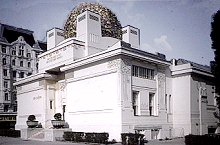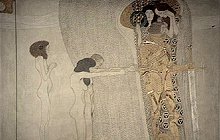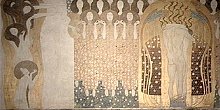| [naar
inhoudsoverzicht muziekgeschiedenis]
[naar
inhoudsoverzicht korte biografieen]
[naar Webern-
biografie
1]
[terug naar inhoud
Webern-biografie 2]
[naar
literatuurlijst]
|
Vienna at the turn of the century

The Wiener Secession
Vienna was besides Berlin and Prague the most important cultural center
at the turn of the century. In addition to the Secessionists (Gustav Klimt,
Egon Schiele, Oskar Kokoschka, Alfred Loos), who formed decisively the
development of the Jugendstil, the authors such as Arthur Schnitzler, Peter
Altenberg and Karl Kraus made of Vienna an intellectual center of the Austro-Hungarian
Empire.

Gustav Klimt: Beethoven frieze (detail)
Musically, the Danubian metropolis lived off its „classic" and „romantic"
heritage (Haydn, Mozart, Beethoven, Schubert, Brahms, Bruckner). In his
function as director of the Imperial and Royal court opera (Wiener Staatsoper),
the composer Gustav Mahler (1860-1911) applied with the stage designer
Alfred Roller new standards to the production of operas, broke in his symphonies
with the late Romantic style and laid the foundation for the musical modernity.
Besides him, Alexander von Zemlinsky (1871-1942) and Franz Schreker (1878-1934)
worked both in an extraordinarily innovative and progressive way as composers
and conductors as well.

Gustav Klimt: Beethoven frieze (detail)
What Mahler, Schreker and Zemlinsky had gained after often wearing struggles
with the public and the press was continued with radicality by the „second
Viennese school" around Arnold Schönberg, Alban Berg and Anton von
Webern. Through the abrogation of the laws of tonally slurred harmonics,
it forced the replacement of the romantic aesthetics of the 19th century
and showed new ways - parallel to Igor Strawinsky in France - to the music
of the 20th century.
The „second Viennese school" saw itself as continuation of the
„first Viennese school" with the classical composers Haydn, Mozart and
Beethoven. In 1947, Schönberg admitted in a memorial writing to his
student and friend Anton von Webern: „People will have to mention the three
of us - Berg, Webern, Schönberg - together, like an unity, because
we have believed with intensity and ready to make sacrifices devotion in
once seen ideals and would never give them up, even if they would succeed
in confusing us."
|